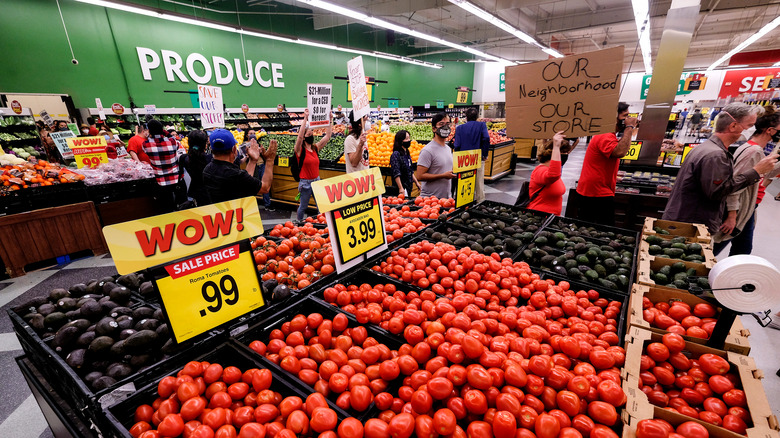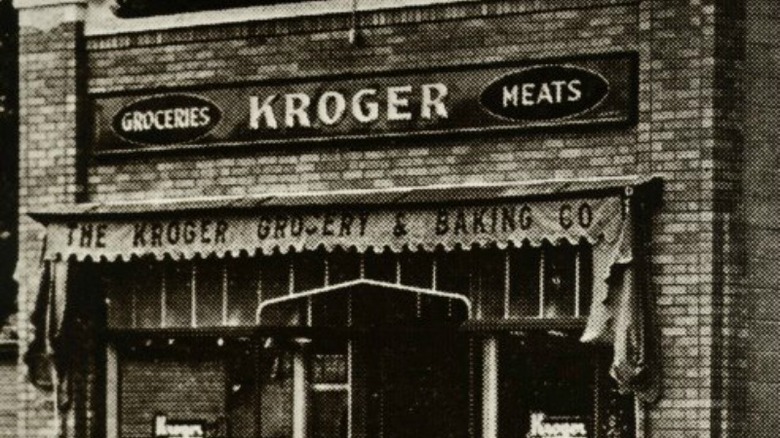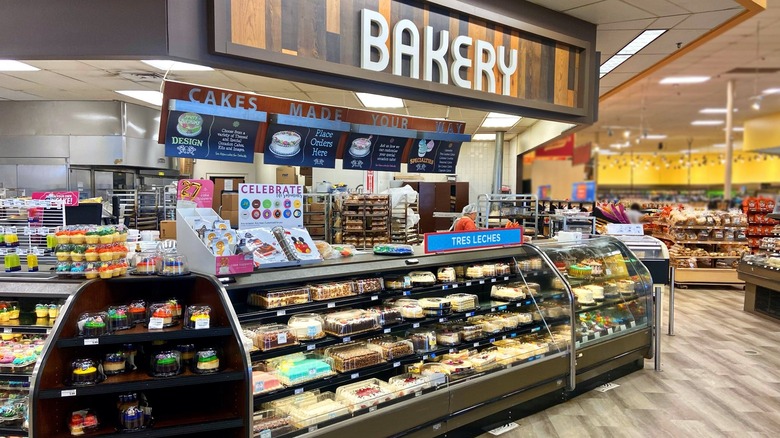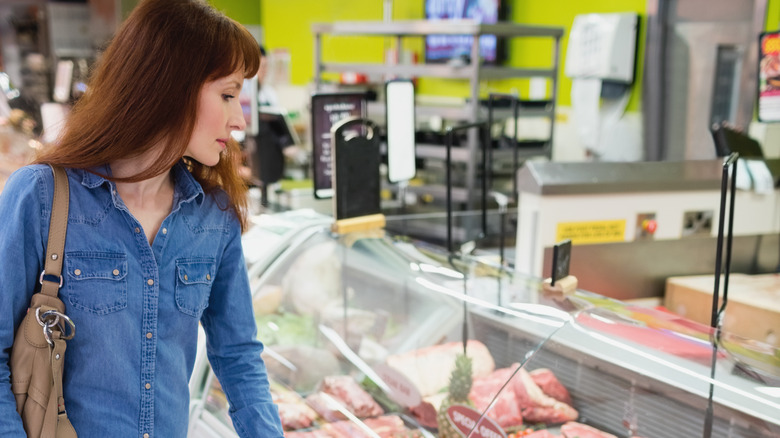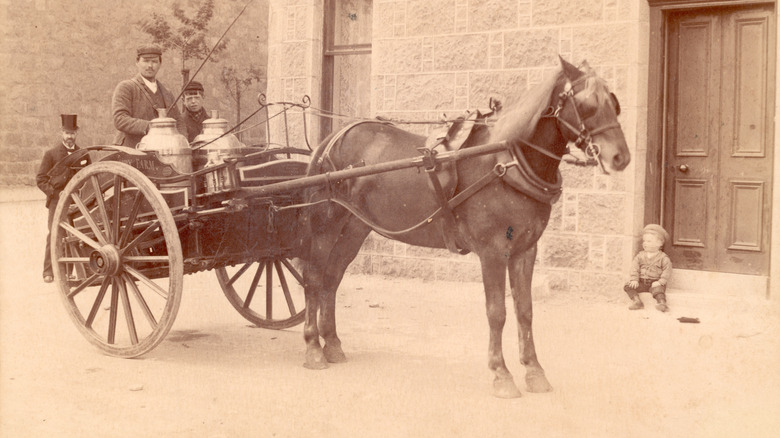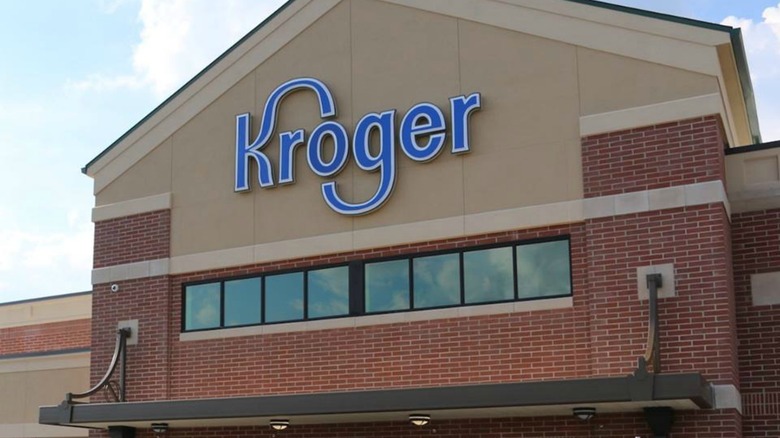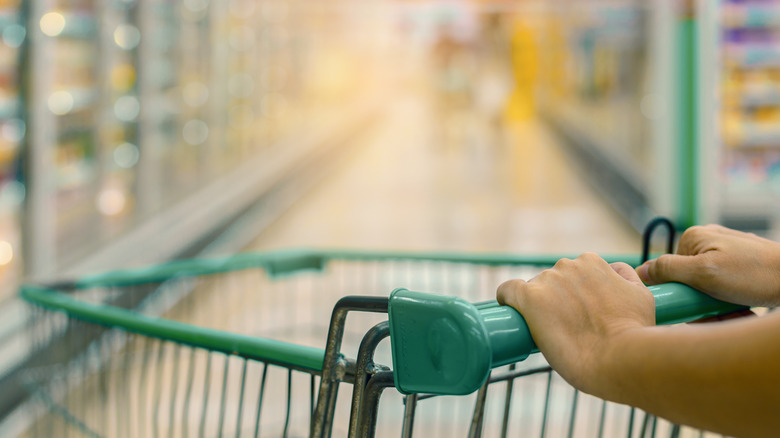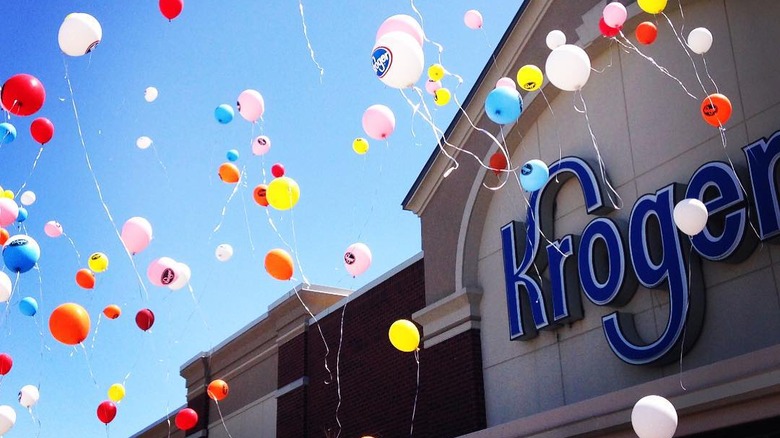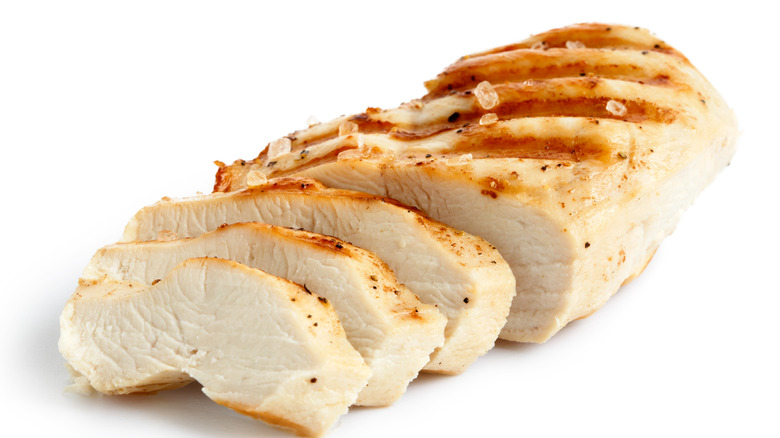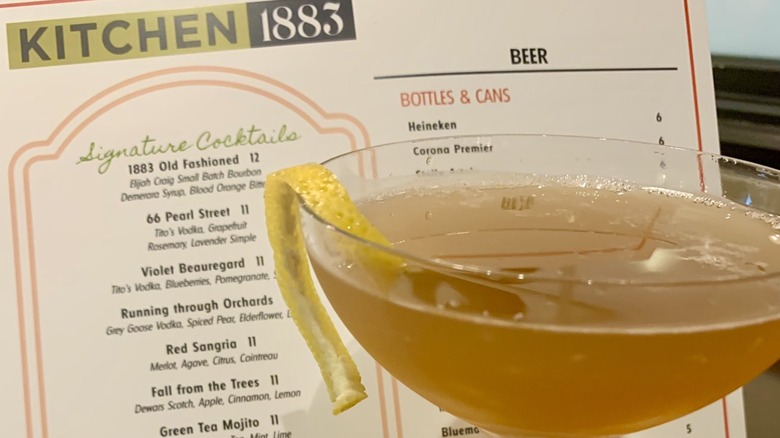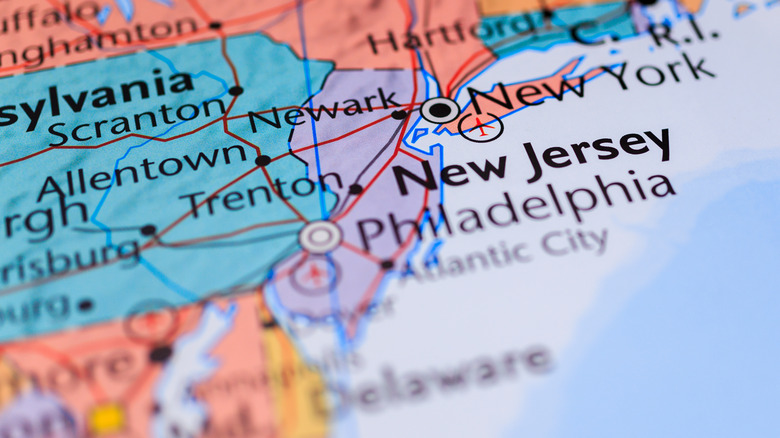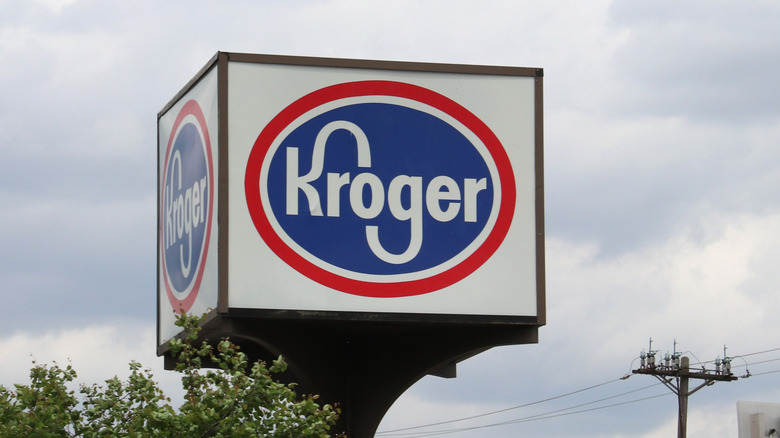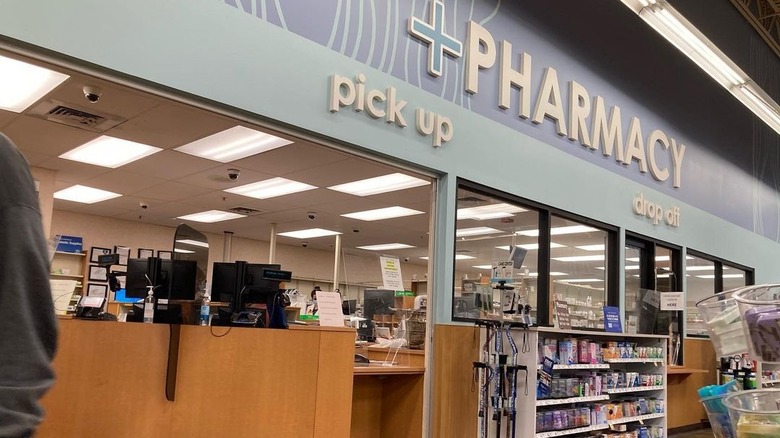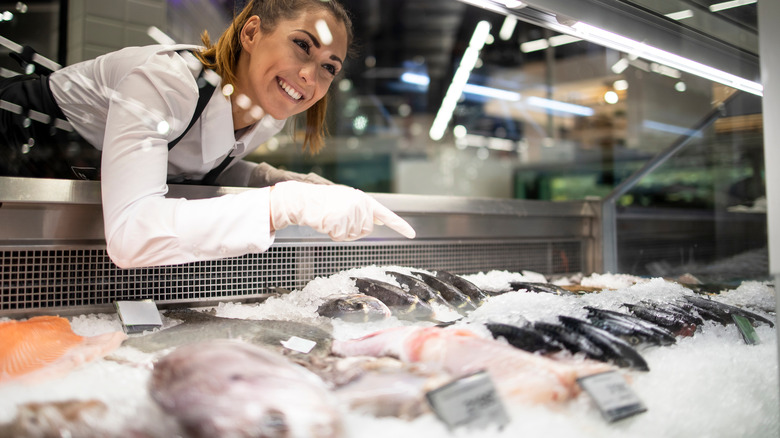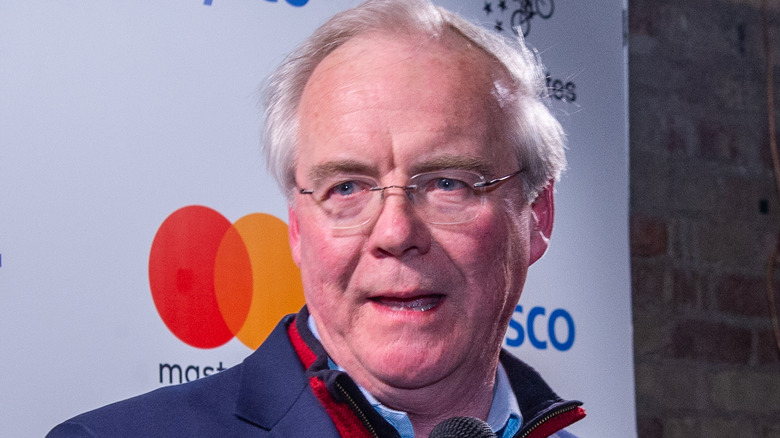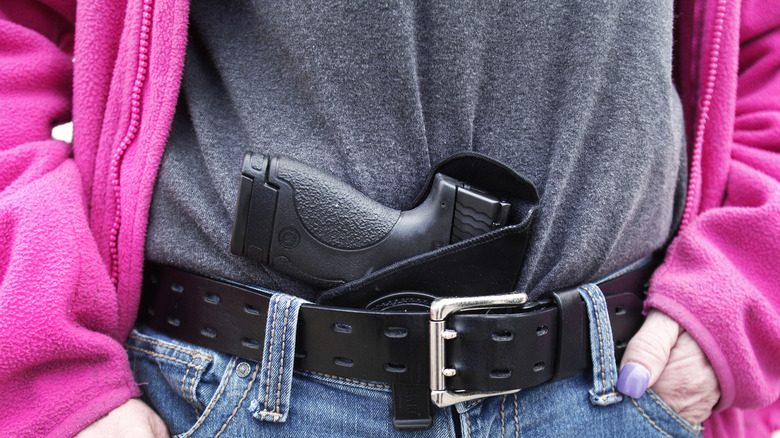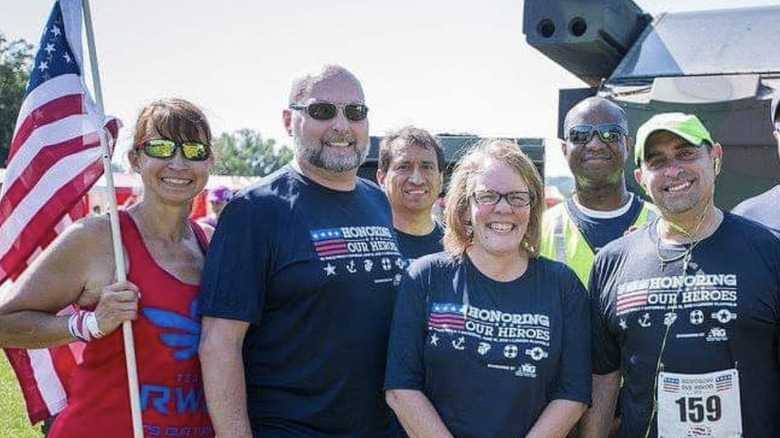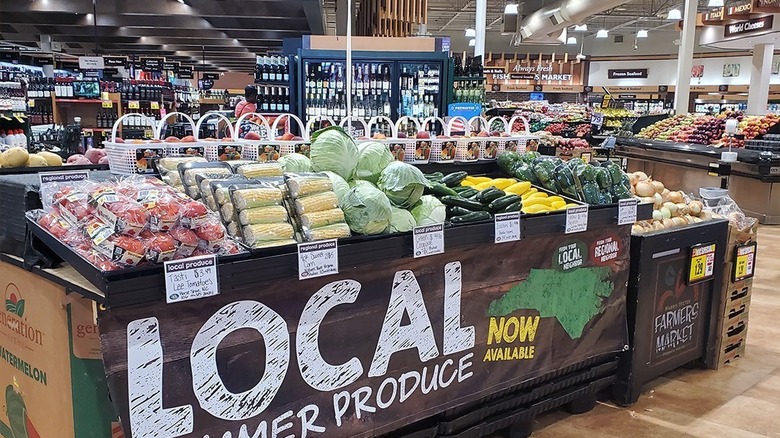The Untold Truth Of Kroger
Kroger is one of the most recognizable chains there is. Chances are, you've shopped there at some point whether it's for groceries, a bottle of wine, or even makeup or clothing. The grocery store has a very long history, and has gone through a lot of changes since it was first founded. Kroger has grown from humble origins to being a household name, but in spite of its popularity, most of its customers would be surprised to know these details about the store.
It has been in business for more than a century
Kroger is much older than most people realize. Founder Bernard Henry Kroger was the son of German immigrants, and his father owned a dry goods store in Cincinnati. Despite watching his father's company fail, Kroger was inspired to go into business for himself in 1883. He was only in his early 20s when he started the company, and would later go on to pass it down to his own son, Bernard H. Kroger Jr.
Not only did Kroger start his business at a young age, but more surprisingly, he dropped out of school at 13 (via Immigrant Entrepreneurship). The financial panic of 1873 destroyed his father's dry goods business and he died shortly after, forcing young Kroger to drop out of school and work to support his family. The knowledge he learned from his father helped him become a salesman, despite his lack of education.
While these days you can go to Kroger for everything from bananas to toilet paper, it began with limited offerings. Kroger actually entered the world of business selling tea. Along with a friend, he opened the Great Western Tea Company in 1883. He bought out his partner the following year and expanded the business under that company name before finally renaming it Kroger Grocery and Baking in 1902. According to The Kroger Company, its founder poured his entire savings of $372 into that first store. Adjusted for inflation, that would be about $11,187 today.
Kroger pioneered the on-site bakery
At the turn of the 20th century, grocers who sold bread and other baked goods would have to buy them from bakers and resell them in their stores. Unhappy with this idea, Kroger decided to open his own bakery. This not only cut down on the cost of purchasing baked goods but also allowed Kroger to sell them at a lower price, leading to greater profits margins and revolutionizing the grocery store baking industry.
Kroger was the first to sell fresh meat with groceries
While modern consumers are accustomed to going to one store to purchase all of their food, this is a relatively new concept. Meat would typically be purchased from a butcher, bread from a baker, and groceries from a grocer. Kroger's implementation of on-site meat counters was revolutionary at the time and made him the first in the country to sell meat and groceries under the same roof.
The founder received death threats because of his low prices
Kroger's prices were so low that other business owners were threatened by him. When he began selling his own bread, bakery chains were scared that he would put them out of business. He began receiving death threats from his competition. One of the notes delivered to his home read, "If you don't raise the price of bread at once you will be killed or shot." Kroger wasn't intimidated, though; he responded to the threats by expanding his bakeries.
They introduced product testing
Kroger was well known for his dedication to providing consumers with the best quality. This dedication to quality and customer service led the company to become the first grocery chain to monitor the quality of products sold. This is something that's expected of stores today, and we have Kroger to thank for implementing the policy back in the 1930s. The innovations don't end there. Kroger was also the first grocery stores to use electronic scanners, first testing the technology in 1972.
Kroger was the first store where you could do your own grocery shopping
In the 19th century, groceries were typically delivered to the home. The customer would order what they wanted and the order would later be delivered by horse-drawn wagon (although Kroger delivered groceries with Model T trucks beginning in 1913). In 1916, Kroger upended the delivery system by introducing self-service shopping to the public, allowing customers to go to the store, shop, and bring the merchandise home themselves instead of waiting for a delivery.
They turned down the chance to be the first supermarket
Kroger could have been the first supermarket in the country if only they had listened to former manager, Michael Cullen, in 1930. Cullen proposed massive stores with large parking lots, and a variety of goods sold at low prices. According to Forbes, Cullen believed that "anticipated greater use of the automobile and home refrigeration would allow customers to abandon daily trips to the butcher, baker etc., in lieu of weekly trips to the supermarket–where everything could be purchased under one roof."
Kroger rejected Cullen's idea so he left and opened King Kullen, the first supermarket. The format would later be adopted by Kroger after Cullen proved its success.
You've probably been to a Kroger-owned store without even knowing it
Think you've never been to a Kroger? Think again. There are a lot of companies owned by Kroger, so even if you're certain you've never set foot inside a Kroger in your life there's a good chance you've given them your business. Some of the more well-known stores owned by the grocery giant include Dillons, King Soopers, Ralph's, Quality Food Centers, and Smith's Food and Drug.
Kroger is one of the biggest supermarket chains in the world
Kroger is one of the world's largest supermarket chains — which is an astounding feat considering that it doesn't even have stores in all 50 states, let alone in any other countries. According to the Kroger website, they have almost 2,800 stores located in 35 states. Kroger's lack of international presence does nothing to hurt business and the multi-billion dollar company's revenue comes in third compared to all of the other supermarket chains in the world.
They've been criticized for false marketing of their Simple Truth chicken
Kroger found itself in trouble in 2014 for some shady marketing. According to a lawsuit, the store claimed that the chicken meat sold as part of its "Simple Truth" line was "humanely raised." It was found, however, that the chickens "were raised under standard commercial farming conditions." Kroger agreed to remove the claim that the animals were from a humane environment from all packaging, although they maintained that the claim was accurate.
They own one of the largest jewelry chains in the country
One of America's biggest jewelry retailers, Fred Meyer Jewelers, is affiliated with Kroger. The jewelry chain has been around 1973, but it was its merger with Kroger that helped it become the country's third largest jewelry chain. While the store does also operate online and in department stores, many Kroger Marketplace locations have a jewelry department featuring Fred Meyer Jewelers.
Kroger restaurants are now a thing
Kroger started out in 1883 as the Great Western Tea Company, and after conquering the world of groceries, it has now moved over to food service. The pilot chain of brew pub-style restaurants called Kitchen 1883 is named after the parent company's year of origin. As of 2022, there are two Kitchen 1883 outlets, both near Kroger's Cincinnati headquarters: one in Union, Kentucky, and the other in Anderson, Ohio. The company also runs On the Rhine Eatery, a 7,000-square-foot food hall above a Kroger store that includes four restaurants and a bar. All outlet menus feature comfort food and hand-crafted cocktails.
In partnership with ghost kitchen operator Kitchen United, Kroger's runs industrial restaurant kitchens out of its Houston and Dallas locations, according to Supermarket News. As such, diners who use the MIX online ordering platform in Texas think they're getting delivery from one of 15 restaurants, including Fuddruckers, Buca di Beppo, MrBeast Burger, or the Wing Zone, but are actually eating food prepared by Kroger.
Why there's no Kroger in New Jersey
It's one of the biggest supermarket chains in the United States with nearly 3,000 stores under its corporate umbrella, and yet, Kroger doesn't have a retail presence in all 50 states. Kroger-controlled stores (under more than 25 different brand names) occupy about three-quarters of the country but are notably and conspicuously absent from densely populated New Jersey and Pennsylvania. According to NorthJersey, in 2014 Kroger seemed poised to move into the Atlantic northeast after acquiring Harris Teeter markets in adjacent Delaware and Maryland.
When A&P grocery retailer filed for bankruptcy, industry pundits figured Kroger would swoop in and purchase the company's outlets in New Jersey and Pennsylvania. It didn't, likely because the company didn't want to compete with Wakefern, a co-op of individual supermarkets and their owners. Local stores like ShopRite and Stop & Shop enjoy fierce consumer loyalty, and through Wakefern, wield tremendous industry power. To gain a toehold in the region would be exceedingly difficult for Kroger so it simply opted out.
The largest-ever Kroger store is in Cincinnati
Every few years, Kroger sets itself apart from the competition by really putting the "super" in "supermarket." In 2003, according to Supermarket News, the company upgraded and expanded one of its outlets in the Oakley area of Cincinnati (five miles from Kroger headquarters) that had first opened in 1961 into a 103,000-square-foot mega-store. At the time, it was the largest Kroger in existence, boasting a 40-item produce section, 4,500 natural foods, 350 top-shelf wines, and 50 kinds of fresh-baked bread.
Just 12 years later in 2015, according to the Cincinnati Business Courier, Kroger beat its own in-house record by opening the Kroger Marketplace at Oakley Station. Also in Cincinnati, the $28 million build was the latest giant store for the chain and covered an area of 145,000 square feet. Among other services, it includes a clinic, pharmacy, sushi bar, cheese shop, and jewelry counter.
Kroger sells a lot more than food
Kroger ranks among the top 10 largest grocery store conglomerates in North America as of 2021, according to Food Industry, but it's less similar to the likes of Albertsons, Food Lion, and Publix than it is to ambitious omnipresent retailers like Walmart or Amazon. Over the last few decades, Kroger has grown and expanded in not only its number of units, but in the variety of stores it operates, the items it sells, and the services it offers.
Under various names (retained after buying them), The Kroger Company runs the supermarket chains Ralphs, Dillons, King Soopers, Fry's WFC, City Market, Metro Market, and Pick 'n Save, among others. It's also the corporate parent of Fred Meyer, a Western big box chain that sells groceries, clothes, housewares, garden supplies, athletic equipment, and home improvement gear.
Kroger has essentially transformed its large-square-footage stores into shopping malls with everything you might possibly need available under one roof. In the late 1990s, it even started installing gas pumps, and as of the mid-2010s, controls more than 1,400 full-service fueling centers. The company offers its own financial services, wireless plans, and more than 2,000 pharmacies.
Greenpeace isn't keen on Kroger's fish
Kroger sells a high volume of fish and seafood across its numerous stores. Meanwhile, environmental protection agency Greenpeace advocates for green, earth-saving measures on a global scale, holding accountable governments and corporations that it believes contribute to the erosion of natural resources. As such, the two organizations clashed in 2014.
According to Greenpeace's Sustainable Seafood Consumer Hub, Kroger ranked at the bottom of the list of grocery stores when it came to harvesting, purchasing, and selling sustainable seafood. Greenpeace reported that Kroger and both its affiliates and sub-companies regularly sold 18 of the 22 "Red List" species of fish. According to the organization, these fish shouldn't be sold commercially as their harvesting violates certain criteria. For example, overfishing has led to low populations and potentially irreparable damage to the oceans and their ecosystems. Among the 18 fish that Greenpeace says Kroger shouldn't sell are some very popular options, including Alaska pollock, Atlantic cod, Chilean seabass, red snapper, and South Atlantic albacore tuna.
Kroger paychecks varied greatly during the COVID-19 pandemic
The COVID-19 pandemic wrought challenges and unpredictability upon grocery and retail sectors. Public place shutdowns, mask requirements, and employment issues — all related to limiting the spread of the virus — changed the way companies like Kroger conducted business. CEO Rodney McMullen was handsomely rewarded for his efforts in guiding the company through those unprecedented times.
In 2020, he earned a total compensation package of $20.6 million, a major jump up from the $14.2 million he received the previous year, according to the Cincinnati Enquirer. In the same year, Kroger hired new workers by the tens of thousands to meet the labor demand, as the store's customers made use of pickup and delivery services. As a result, the average pay for Kroger workers dropped by more than $2,000 or 8% in 2020, falling to $24,617 per yearly median.
Kroger agreed to raise wages to a minimum of $16 per hour in 2021, and per the Cincinnati Enquirer, that accounted for a rise in the yearly average worker pay to $26,763. CEO McMullen even took a pay cut to go with his workforce's pay raise, and in 2021, his compensation package fell by $2.6 million to $18 million. Nevertheless, according to Economic Roundtable, 14% of Kroger employees grappled with being unhoused in 2021, while more than 75% experienced food insecurity. All the while, executive benefits and profits have grown, while the real wages and buying power of store-level employees have declined.
Kroger faced controversy for allowing shoppers to carry guns in stores
Gun control is a sensitive, tricky, and tense political issue in the United States. Laws about who can carry what kind of firearms and where vary from state to state. Many jurisdictions allow for "open carry," or the right to have a gun visibly displayed on one's person in public places. Businesses also have the right to ban guns from their premises, but as of 2014, Kroger was not one of those companies.
According to HuffPost, the gun control organization Moms Demand Action for Gun Sense in America called out Kroger for permitting open carry across most of its 2,500 stores. The organization targeted Kroger because some stores in Ohio and Texas had previously hosted pro-open carry protests. Additionally, more than 12 shootings had occurred at Kroger locations over the two years prior.
Efforts by Moms Demand Action for Gun Sense and other groups have effectively made several big food companies and retailers institute gun bans, including Chipotle, Starbucks, Sonic, Chili's, Jack in the Box, and Target. In 2019, five years after Kroger was called out, the retailer banned guns from all 2,800 of its stores, according to Time.
Kroger has hired thousands of veterans
According to Statista, the entire Kroger company has employed at least 400,000 people at its thousands of stores during each year of the past decade. That makes the retail and grocery mogul a significant job provider to the general public. Kroger has also made a strong and enduring commitment to hiring both veterans and active duty members of the many branches of the U.S. Armed Forces.
Kroger notes that a major percentage of its workforce are combat or uniformed personnel — since 2009, the company has hired approximately 45,000 veterans. Utilizing this direct channel into the American military family community, Kroger also operates an internal Veterans Associate Resource Group to provide specific services and opportunities to employees with a military background. The company even donates time and labor to military-related or supporting causes, including Warrior Homesteads, the Honoring Our Heroes 5K fundraiser race, and Zero Hunger Zero Waste, an overarching sustainability and anti-hunger initiative.
Kroger is the largest florist in the world
Apart from food and household staples, Kroger is also one of the United States' leading purveyors of cut flowers and decorative plants. For decades, the chain has touted itself as "America's largest florist," as it moves countless flowers across its numerous locations. That's a lot of roses, carnations, daisies, and the like, making for a hefty chunk of Kroger's revenue. According to GroceryDive, research shows that the average large grocery store outlet in 2015 earned about $225,000 a year in flowers, with a massive profit margin of 44%.
Kroger proudly shows off its flower prowess, too. In 2017, Kroger put some extra time, money, and effort into flower sales, launching a private label store brand called Bloom Haus. And since 1987, expert florists employed by Kroger's head office have been responsible for providing the Garland of Roses, the traditional floral prize for the horse and jockey that win the Kentucky Derby.
Kroger bought Harris Teeter for billions
Kroger is even bigger than its core business, the chain of Kroger-branded grocery stores. The 2,700 or so outlets it operates includes many small, medium, and large-sized regional retail and grocery chains. Beginning in earnest in the 1990s, Kroger went on an acquisition spree, bringing in Pay Less Supermarkets, Great Scott, JayC Food Stores, and Hilander Foods. In 1998, it made its biggest play yet to that point, by merging with the West Coast chain Fred Meyer, which was the parent company of other chains Smith's, QFC, and Ralphs (via The New York Times).
Most of those stores still operate under their original names and signage, including Harris Teeter. In 1999, according to the Charlotte Business Journal, Kroger traded 10 of its stores in Greensboro, North Carolina, for 11 Harris Teeter locations in Virginia. That was the first move in what would eventually be an outright complete acquisition of Harris Teeter. In 2013, per CNBC, Kroger paid $2.5 billion for the grocery company, which comprised all 212 locations in operation at the time. It was also a strategic move — Kroger simultaneously acquired Harris Teeter's industry pioneering online grocery shopping system, a pre-emptive strike against Amazon Fresh and other shop-from-home competitors, as CEO Rodney McCullen told the Cincinnati Business Courier.
